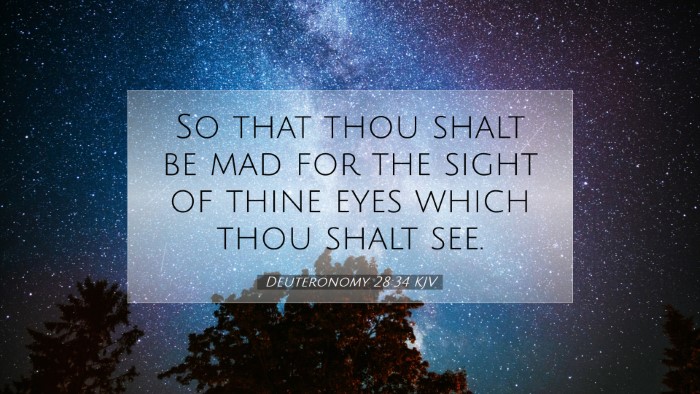Commentary on Deuteronomy 28:34
Verse Reference: "So that you shall be mad for the sight of your eyes which you shall see."
Introduction
This verse comes from the heart of Moses' warnings to Israel as they prepare to enter the Promised Land. It depicts the catastrophic consequences of disobedience to God’s commandments. The chapter outlines blessings for obedience and curses for disobedience, establishing a covenant framework where choices have divine repercussions.
Contextual Background
Deuteronomy, as a book, represents Moses' final discourse to the Israelites before they enter Canaan. It is a recapitulation of the law given at Sinai, emphasizing the importance of obedience to ensure stability, prosperity, and God’s favor. Moses paints a stark contrast between the rewards of fidelity and the severe penalties of infidelity to God. This particular verse falls under the thematic consequences of disobedience.
Commentary Insights
Matthew Henry's Perspective
Matthew Henry highlights the madness that comes from unmet expectations resulting from God's judgments. He notes that the phrase "you shall be mad" indicates a state of extreme distress and confusion. This madness stems from witnessing the overwhelming devastation around them — their loved ones, fields, and cities suffering as a direct consequence of sin. It emphasizes the emotional and spiritual anguish that results from God's removal of mercy.
Albert Barnes' Reflection
Albert Barnes delves into the psychological implications of witnessing calamities brought on by disobedience. He examines the "sight of your eyes," noting that the Hebrew term suggests personal, visceral experiences of grief and horror. The despair and shock from witnessing destruction, loss, and the dire consequences for the community would lead to an almost irrational mental state. He underscores that this verse serves as a solemn warning regarding the gravity of moral failings and their societal impact.
Adam Clarke's Analysis
Adam Clarke provides a thorough exegesis on the phrase "mad for the sight of your eyes." He explains that such madness parallels mental breakdowns when confronted with stress and suffering beyond comprehension. Clarke indicates that the destruction resulting from disobedience would not only affect the physical realm but would also bring about spiritual disarray, underscoring the holistic nature of Israel’s relationship with God. He emphasizes that the theological implications are profound, as they relate directly to the covenantal relationship established by God with His people.
Theological Implications
This verse serves as a poignant reminder of the seriousness of sin and the divine justice that follows. The madness mentioned here reflects a profound spiritual disconnection that results when the covenantal path is forsaken. The passage illustrates how closely tied are a nation’s physical well-being and its spiritual fidelity. For pastors and theologians, this raises significant areas of reflection regarding contemporary faith communities—where disobedience can equally lead to communal despair.
- The Nature of God’s Covenant: God's relationship with His people is contingent on their adherence to His commands.
- Faith and Reason: The madness signifies the loss of rationality when one strays from divine guidance.
- Spiritual Preparedness: The chaos that follows disobedience affects individual and communal stability, underscoring the need for collective faithfulness.
Applications for Today
In its essence, Deuteronomy 28:34 challenges modern believers to reflect on the nature of their commitment to God. The potential for spiritual madness in neglecting divine principles acts as a sobering thought for congregations and leaders alike.
Pastoral Insights
Pastors conducting funerals of vibrant faith communities need to reflect on the spiritual dangers of communal distortion. In shepherding their flocks, leaders must encourage true faithfulness, warning against the madness that comes through straying from divine truth.
Theological Reflections
Theologians could explore further the manifestations of divine judgment in historical contexts, examining cases when nations have turned from prevailing truths. This dialogue could lead to deeper discussions on the collective responsibility of believers.
Personal Application
For individual believers, this verse emphasizes the need for personal vigilance. Maintaining a close relationship with God through prayer, scripture, and community can prevent the kinds of spiritual madness described. Examining personal conduct and its alignment with God’s directives can foster resilience against the temptations of disobedience.
Conclusion
Deuteronomy 28:34 lays bare the tragic potential of forsaking God’s commands. It serves as a spiritual warning, embedded within the narrative of a nation that once walked closely with God. Insights drawn from public domain commentaries reveal how the weight of this verse extends beyond ancient Israel, reaching into the lives and practices of contemporary believers. As God's people, the call to obedience is a call to freedom from madness and a step toward spiritual health.


